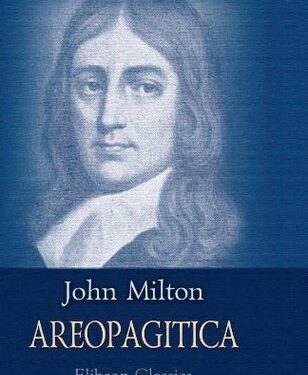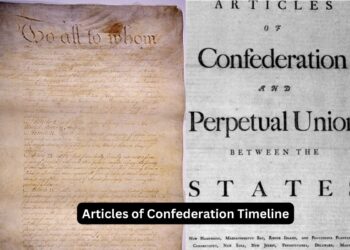“Areopagitica” is a famous essay written by the English poet and scholar John Milton in 1644. The full title of the work is “Areopagitica: A Speech for the Liberty of Unlicensed Printing to the Parliament of England.” It is considered one of the most influential defenses of free speech and expression in the English language.
Areopagitica Essay Summary By John Milton-In “Areopagitica,” Milton argues against the strict censorship laws imposed by the English government at the time, particularly the Licensing Order of 1643, which required all books to be licensed and approved before publication. Milton’s essay takes the form of a passionate and logical argument, drawing on classical references and historical examples to support his case.
Areopagitica Essay Summary By John Milton-The essay is named after the Areopagus, a hill in Athens where the ancient Greek courts met and where free speech and debate were encouraged. Milton uses this reference to emphasize the importance of allowing free and open discussion in society.
Also Read-
- The Anatomy of Melancholy Essay Summary By Robert Burton
- On Some Verses of Virgil Essay Summary By Michel de Montaigne
- Against Joie de Vivre Essay Summary By Phillip Lopate
- The Little Store Essay Summary By Eudora Welty
Areopagitica Essay Summary By John Milton-Milton’s central argument is that censorship stifles intellectual and moral progress.
Areopagitica Essay Summary By John Milton-He believes that truth and knowledge can only be arrived at through open debate and the clash of ideas. He asserts that individuals should have the freedom to express their thoughts and opinions, even if they go against prevailing norms or challenge established authorities. Milton argues that by allowing a wide range of voices to be heard, society can better discern truth from falsehood and advance in knowledge.
Moreover, Milton expresses his skepticism about the ability of any authority, be it the government or religious institutions, to determine what is true or right. He asserts that individuals should be allowed to exercise their own judgment and conscience in matters of belief and expression.
Areopagitica Essay Summary By John Milton-Milton’s argument also touches on the role of education in fostering critical thinking and individual liberty. He advocates for a society where individuals are educated and empowered to discern truth and falsehood for themselves, rather than relying on external authorities to determine what they can or cannot read or say.
In summary, “Areopagitica” is a passionate defense of freedom of speech and expression. Milton argues against censorship, advocating for the importance of open debate, individual judgment, and the pursuit of truth in society. His essay continues to be celebrated as a landmark work in the history of free speech.
About John Milton
John Milton was an English poet, polemicist, and civil servant who is widely regarded as one of the greatest writers in the English language. Born on December 9, 1608, in London, Milton lived during a time of great political and religious upheaval in England.
His works, both poetry and prose, reflect his deep engagement with the political and religious debates of his era. Milton’s most famous work is his epic poem “Paradise Lost,” but he also wrote numerous other influential works that continue to be studied and celebrated today. This essay will explore the life, works, and lasting legacy of John Milton.
Areopagitica Essay Summary By John Milton-Milton grew up in a well-educated and prosperous family. His father, John Milton Sr., was a scrivener, and his mother, Sarah Jeffrey, was a devout Puritan. Milton received an excellent education, attending St. Paul’s School in London and then going on to study at Christ’s College, Cambridge. At Cambridge, Milton demonstrated his exceptional intellect and poetic talent, publishing his first poem, “On the Death of a Fair Infant,” in 1626.
After completing his studies at Cambridge, Milton initially intended to pursue a career in the Church. However, he soon became disillusioned with the state of the Anglican Church and decided to devote himself to literature and public service. In the 1630s, Milton embarked on a European tour, visiting Italy, where he immersed himself in the works of classical authors such as Homer, Virgil, and Dante. This trip had a profound influence on his writing and shaped his poetic style.
Areopagitica Essay Summary By John Milton-Upon returning to England, Milton became increasingly involved in the political and religious debates of the time. He fiercely championed individual liberty and opposed censorship and tyranny. In his famous tract, “Areopagitica,” published in 1644, Milton passionately argued for the freedom of the press, asserting that truth and falsehood should be allowed to compete in the marketplace of ideas. This work remains a cornerstone of modern arguments for freedom of speech and expression.
During the English Civil War, Milton became an ardent supporter of the Commonwealth, the republican government established after the execution of King Charles I. He wrote numerous pamphlets defending the principles of the Commonwealth and advocating for the execution of the king. One of his most significant political works is “The Tenure of Kings and Magistrates,” published in 1649, in which he argues that the people have the right to overthrow a tyrannical ruler.
Areopagitica Essay Summary By John Milton-However, Milton’s political fortunes took a turn after the restoration of the monarchy in 1660. Due to his support for the regicide and his opposition to the monarchy, Milton was briefly imprisoned and faced financial difficulties. Despite these setbacks, he continued to write and publish works, albeit on a smaller scale.
Milton’s most famous work, “Paradise Lost,” was published in 1667. This epic poem, composed in blank verse, tells the biblical story of the fall of man, with a particular focus on the character of Satan. “Paradise Lost” explores profound theological and philosophical themes, including the nature of evil, free will, and theodicy. The poem showcases Milton’s mastery of language and his ability to create vivid and complex characters.
Areopagitica Essay Summary By John Milton-In addition to “Paradise Lost,” Milton also wrote its sequel, “Paradise Regained,” which was published in 1671. This shorter epic depicts the temptation of Christ in the wilderness and his triumph over Satan. Milton’s other notable works include “Samson Agonistes,” a tragedy based on the biblical story of Samson, and numerous sonnets and shorter poems.
Conclusion
“Areopagitica” by John Milton is a powerful and influential essay that passionately defends the freedom of speech and expression. Milton’s arguments against censorship are grounded in the belief that open debate and the clash of ideas are essential for intellectual and moral progress. He emphasizes the importance of allowing individuals to express their thoughts and opinions, even if they challenge prevailing norms or authority.
Areopagitica Essay Summary By John Milton-Milton’s skepticism about the ability of any authority to determine what is true or right highlights the need for individual judgment and conscience. He argues for a society where individuals are educated and empowered to discern truth for themselves, rather than relying on external authorities to dictate what they can or cannot read or say.
The essay also underscores the role of education in fostering critical thinking and individual liberty. Milton advocates for a society where individuals have the knowledge and tools to engage in thoughtful and informed discussions, enabling them to distinguish between truth and falsehood.
Areopagitica Essay Summary By John Milton-Overall, “Areopagitica” continues to be revered as a landmark work in the history of free speech, promoting the values of open debate, intellectual freedom, and the pursuit of truth. It serves as a timeless reminder of the importance of protecting and cherishing the right to express one’s thoughts and ideas without fear of censorship or suppression.
FAQ.
Q. Why did John Milton write “Areopagitica”?
Ans. John Milton wrote “Areopagitica” in response to the strict censorship laws imposed by the English government during his time, particularly the Licensing Order of 1643. He believed that these laws stifled intellectual and moral progress and wanted to advocate for the importance of free speech and expression.
Q. What is the main argument of “Areopagitica”?
Ans. The main argument of “Areopagitica” is that censorship hinders the pursuit of truth and knowledge. Milton asserts that open debate and the clash of ideas are essential for intellectual progress, and individuals should have the freedom to express their thoughts and opinions, even if they go against prevailing norms or authority.
Q. What does the title “Areopagitica” mean?
Ans. The title “Areopagitica” is derived from the Areopagus, a hill in Athens where the ancient Greek courts met and where free speech and debate were encouraged. Milton references the Areopagus to emphasize the importance of allowing open discussion in society.
Q. What is the historical context of “Areopagitica”?
Ans. “Areopagitica” was written during a time of political and religious upheaval in England. The essay was a response to the Licensing Order of 1643, which aimed to control the publication of books and pamphlets during the English Civil War. Milton’s work reflects the tension between government authority and the desire for intellectual freedom.
Q. How did “Areopagitica” impact the discourse on free speech?
Ans. “Areopagitica” is considered one of the most influential defenses of free speech and expression in the English language. It contributed to the development of the concept of free speech as a fundamental right and influenced subsequent discussions on the importance of intellectual freedom and the dangers of censorship.
















